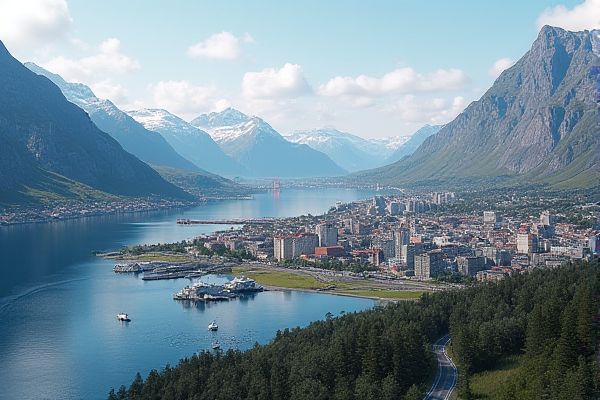
Moving to Norway checklist: Residence permits and visas. Understanding Norwegian tax system. Learning basic Norwegian language. Cost of living considerations. Housing and accommodation options. Health insurance requirements. Opening a Norwegian bank account. Navigating Norwegian public transportation. Cultural norms and etiquette. Employment laws and regulations.
Residence permits and visas
To move to Norway, you need to apply for a residence permit if you plan to stay more than 90 days, which involves gathering specific documents, applying online through the UDI Website, and paying the application fee. There are temporary and permanent residence permits, each with different requirements based on the reason for your stay, such as work, study, or family reunification.
Understanding Norwegian tax system
In Norway, residents are taxed on their worldwide income, while non-residents are taxed only on Norwegian-sourced income. The tax system includes a 22% general income tax and bracket taxes ranging from 1.7% to 17.6% on personal income. Notably, there is a PAYE Scheme featuring a 25% flat rate for non-resident workers with salaries below a certain threshold.
Learning basic Norwegian language
To embark on learning basic Norwegian, it's beneficial to utilize a variety of resources. Platforms like Drops provide an excellent way to build vocabulary, while Duolingo is great for grasping the basics. Pimsleur offers valuable audio lessons to improve pronunciation, and TuneIn can be used to listen to Norwegian radio, enhancing your auditory comprehension skills. For a more interactive learning experience, tools such as Clozemaster, Glossika, and italki offer tutoring and practice opportunities. Additionally, make sure to explore Norwegian On The Web, a free comprehensive course from NTNU, which is ideal for structured learning. Other worthwhile resources include interactive grammar tutorials from CappelenDamm and the complete language learning packages Sett i gang and Godt i gang.
Cost of living considerations
For a comfortable life in Norway, a monthly budget ranging from 3,200 to 3,800 euros is necessary for two adults, while a family with two children would need between 4,500 to 5,000 euros. This budget covers essential expenses such as rent, groceries, transportation, and other necessary services. Costs can vary significantly depending on the region and lifestyle choices. For more in-depth information, Visit Ukraine Today provides a comprehensive overview of the cost of living, helping potential residents plan accordingly and make informed decisions about relocating to Norway.
Housing and accommodation options
When moving to Norway, expats can choose from various housing options including detached houses, terraced/row houses, apartments, and shared houses. Most rental properties are unfurnished but well-equipped, and short-term rentals such as serviced apartments are also available. However, competition for housing can be stiff, especially in major cities like Oslo.
Health insurance requirements
To move to Norway, it is essential to have adequate health insurance that covers all health services during your stay, especially if the duration is less than 12 months. For those planning longer stays, it is mandatory to register with the National Insurance Scheme (NIS) or to provide a European Health Insurance Card (EHIC) or Global Health Insurance Card (GHIC) if applicable. You can find more detailed information on the [UDI website](https://www.udi.no/en/want-to-apply/residence-under-the-eueeu-regulations/eueeu-national-who-has-their-own-funds/), which outlines the necessary requirements and regulations for ensuring your stay in Norway is both legal and secure across different timelines.
Opening a Norwegian bank account
To open a Norwegian bank account, you require a Norwegian National Identity Number or a D-number, along with a passport, a passport-sized photo, and occasionally an employment or lease contract. For non-residents, the options are limited to only a savings account, and the procedure could involve a significant minimum deposit and a waiting period of up to four weeks for verification and processing. For more detailed guidance on banking and financial regulations, you can visit the comprehensive resource at InterNations, which provides valuable insights for expats in Norway navigating the local financial landscape.
Navigating Norwegian public transportation
To navigate Norwegian public transportation, use the travel planner Entur for bus routes and timetables, buy tickets in advance through apps or shops, and utilize integrated ticket systems like Ruter in cities, which cover buses, metro, trams, and ferries, with discounts available for students, seniors, and advance bookings.
Cultural norms and etiquette
When moving to Norway, it is crucial to understand the cultural norms of egalitarianism, respect for privacy, and humility as outlined in the "Janteloven." Norwegians value punctuality, direct communication, and informal yet respectful interactions. They separate business and personal life, with a strong emphasis on table manners and polite public behavior. For comprehensive insights into these cultural aspects, you can explore the extensive resources available at Norway Guide, which offers valuable information to help navigate these nuances successfully.
Employment laws and regulations
Norwegian Employment Law, governed by the Working Environment Act of 2005, mandates written employment contracts, regulates working hours with specified limits, outlines dismissal procedures, and protects employee rights during business transfers. It also allows flexibility through collective agreements and specifies rules for temporary engagements and overtime. For more details, you can visit the Norwegian Employment Law Overview for comprehensive insights.
